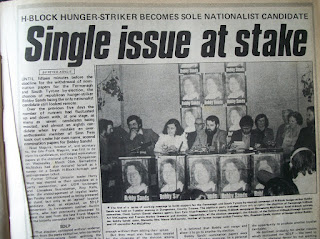
President Obama’s visit was even shorter than anticipated. The President touched down at 9.30 am last Monday morning and by 9.30 pm Airforce One was taking off from Dublin airport enroute to London.
A 24 hour visit became half that due to fears that dust and ash from the erupting Grimsvotn volcano in Iceland might ground all aircraft as happened last year, and delay the President’s departure to Britain.
After first meeting President McAleese and then Taoiseach Enda Kenny, President Obama and his wife Michelle flew to Moneygall in County Offaly where an estimated 3,000 people lined its one main street.
The Obama’s were given a tumultuous welcome. For most of the morning it had rained and as they arrived the sun came out.
The President met his distant relatives and spent a considerable amount of time meeting and greeting local people, signing bits of paper, shaking hands, and then into Ollie Hayes pub for a pint of Guinness.
Moneygall is like many small towns and villages across Ireland. It was from there in 1850 that President Obama’s great, great, great, grandfather, Falmouth Kearney, a shoemaker, emigrated to the USA.
This was in the immediate aftermath of An Gorta Mór – the Great Hunger - just three years after Black 47 when hundreds of thousands died. This was a time when within a decade an estimated 2 million citizens fled Ireland as a result of starvation or eviction or hardship.
Later in Dublin, in front of a capacity crowd in College Green the US President referred to this period in Irish history and the impact it had on the USA: “ But standing there in Moneygall, I couldn’t help but think how heartbreaking it must have been for that great-great-great grandfather of mine, and so many others, to part. To watch Donegal coasts and Dingle cliffs recede. To leave behind all they knew in hopes that something better lay over the horizon.”
Falmouth Kearney was one among millions. Today their descendents occupy pivotal positions in society in the USA. In both political parties, the Democrats and Republicans you will find Irish Americans in leadership; in the Boardrooms, in the news media and the entertainment business; in fact in every strata of US society there are Irish Americans.
President Obama is now one of these and around him is a group of Irish Americans including Vice President Joe Biden; his Chief of Staff Bill Daley; his National security Adviser Tom Donilon and many more. I have met Vice President Biden and Bill Daley. They are enormously proud of their Irish roots and of the contribution Irish America has made to the peace process in Ireland.
This contribution was evident on Monday when we were all reminded by President Obama that he was not the first US President to address thousands in College Green. It was there in December 1995 that President Bill Clinton received a huge welcome from an enthusiastic Dublin crowd. His reception was in large part due to the positive contribution he made at a critical point in the peace process.
And that’s an important lesson for Irish America as we seek to move forward toward our goal of uniting Ireland. 16 years ago the strength of Irish America brought a US President to Ireland to help inject much needed momentum into a peace process that was faltering.
That strength is still evidenced in the decision of President Obama to make his lightning visit earlier this week.
And as Sinn Féin increases our efforts to right the historic wrong of partition and unite the people of this island we will need Irish America to use that strength again.













